Guest contributor
James Shwe
The Myanmar Spring revolution, which began after the 2021 military coup, has been a remarkable display of resilience and courage by the Myanmar people in their fight for democracy.
However, this struggle faces significant challenges, not only from the oppressive military junta but also from dissident revolutionary forces spreading misinformation.
To ensure the success of the revolution and the restoration of democracy, critical thinking and public education play pivotal roles in countering negative propaganda and misinformation.
I. The military junta’s propaganda:
The military junta in Myanmar has a well-established propaganda machine that disseminates false narratives and justifications for their actions. This propaganda aims to manipulate public perception, creating confusion and fear among the populace. Without critical thinking skills, the general public becomes susceptible to these tactics, hindering the progress of the revolution.
A. Disinformation campaigns:
The military junta uses state-controlled media to spread false information, portraying their actions as necessary for stability and national security. They employ censorship and restrictions on independent journalism, limiting access to alternative viewpoints. Critical thinking allows citizens to question these narratives and discern the truth from falsehoods.
B. Manipulating social media:
The military junta utilizes social media platforms to spread propaganda and suppress dissent. Bots and trolls amplify their messages, creating an illusion of support. Public education on media literacy and critical thinking empowers individuals to identify and counter these online tactics.
II. Misinformation spread by the resistance forces:
While the Myanmar Spring Revolution is a collective effort to restore democracy, some dissident revolutionary forces may inadvertently or intentionally spread misinformation that erodes public support for the National Unity Government (NUG).
A. Fragmenting the resistance:
Various factions within the revolutionary movement may have differing agendas and narratives. These differences can lead to confusion among the general public. Critical thinking allows citizens to evaluate the credibility and intentions of different groups, fostering unity within the movement.
B. Propagation of falsehoods:
It is vital for everyone in the revolution to recognize that exaggerating or fabricating information to gain support can cause harm to the movement and bring barriers to building unity and a federal democratic society. This can undermine the credibility of the entire movement. Public education on critical thinking encourages scrutiny of information sources and claims made by revolutionary groups.
III. Critical thinking and public education:
To address these challenges and ensure the success of the Myanmar Spring revolution, a concerted effort is needed to promote critical thinking and public education.
A. Media literacy programs:
Implement media literacy programs in schools and communities to teach individuals how to critically evaluate news sources and information. Promote fact-checking and verification as essential skills for responsible citizenship.
B. Access to reliable information:
Support independent journalism and provide avenues for citizens to access reliable news sources.
Encourage the creation of platforms that prioritize transparency and accuracy.
C. Unity through understanding:
Foster dialogue and understanding among different revolutionary groups to minimize divisions and conflicting narratives. Emphasize the shared goal of democracy and human rights to maintain public support.
The success of the Myanmar Spring revolution depends not only on the bravery of its people but also on their ability to think critically and access accurate information.
To counter the propaganda and the potential misinformation spread, public education and critical thinking must be prioritized. Empowering the general public with these skills will not only strengthen the revolution but also lay the foundation for a more informed and democratic society in the future.
James Shwe is a Myanmar democracy activist in the U.S. and is a member of the advocacy groups Free Myanmar and the Los Angeles Myanmar Movement. He has been trying to organize and motivate the Myanmar Diaspora to advocate for Democracy in Myanmar.
DVB publishes a diversity of opinions that does not reflect DVB editorial policy. We’d like to hear what you think about this or any of our stories: [email protected]



